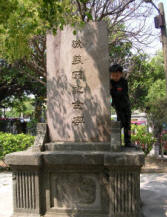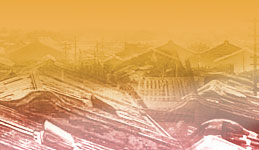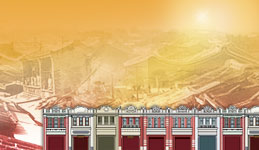          

|
|

|
 Commerce
Hinterland of Ancient Lukang
Commerce
Hinterland of Ancient Lukang
Due
to its superior geographical condition, Lukang's commercial area is
broad ranging from the Dongluo creek (the branch of Jhuoshuei creek) in
the south, Dadu creek in the north to the Bagua hill in the east. Due to
the regular lack of food along the south east coastal line in China,
Lukang, which dominated the geographical hinge, naturally became a
transfer stop for rice and other food and it had been the largest harbor
in central Taiwan since Cian-Long period. The merchant ships coming to
Taiwan from mainland China imported various groceries such as cloth,
tobacco, wood, etc. The commercial benefit was very large and all kinds
of products were sold on the Wu-Fu Street. The well-known “Lukang 8
Jiao” is the organization that controls all these business behaviors.
Among them, the Cyuan-Jiao was the largest one. Judging by the club
house
Cyuan-Jiao had built, we can still imagin how prosperous
Lukang's commerce used to be.
|
|
 |
 |
|
Club house |
Jinyuyuan |
|
|
 TOP
TOP |
 Commercial
Organizations Commercial
Organizations
The
so called “Jiao” refers to the civil organizations composed of city
exporters or wholesalers making sure effective commercial behaviors in
every commercial harbor along the Taiwan coastline in Cing dynasty. This
kind of organization is similar to European guilds during medieval
period. The organizations are started by merchants, organizing same type
of stores and offering same regulations for all members to follow.
Taiwanese Jiao differs from European guild in that Jiao has same
religion and worships the same gods. At that time, the religious
situation was very complicated in Lukang and people worshipped various
gods. We won't discuss this here, but what's worth noticing is that in
the “no sky” market area, only Jiaotou Temple without any major gods.
This is very different from other developed area in Lukang.
Lugang differed
from other commercial harbors in that compared with other cities, Lukang
had a lot more commercial organizations. At that time, Lukang had
eight
organizations while Dan-Shuei had only one. This might be
due to the prosperity of the commerce in Lukang. They resemble nowadays’
commercial guild. Lukang had already had 8 Jiaos before 1816. The names,
business type and number of stores of the 8 Jiaos are listed as Figure
1.
 TOP
TOP |
|
The major stores and business type of 8 Jiaos |
|
Name of the Jiao |
The name of the guild |
Business Type |
Number of stores |
The names of the major
stores |
|
Cyuan Jiao |
Jin Chang Shun |
trade with Cyuan
Jhou and mainly import stones, wood, herbals, silk cloth,
and white cloth. |
more than 200 |
Linrihmao, Wanhehao,
Linshenglong, Cyuanheli, Huangjinyuan, Caiyongmao,
Suyuanshun, Shihchangfa, Shihcianlin, Syucianhe, Cailongsing,
Ouyangcyuansheng, Shihyiyuan |
|
Sia Jiao |
Jin Jhen Shun |
mainly trade with Siamen,
Jinmen, Jhangjhou areas. Export rice, sugar and import fir,
clothes, and bundles of paper. |
more than 100 |
Haishenghao, Chencingchang,
Chenhengji, Shihhehe, Shihrueicheng, Jhuangciansheng |
|
South Jiao |
Jin Jin Yi |
trade with Guangdong,
Penghu, and South Pacific areas and import largely salted
fish, groceries, and fries. |
about 70 to 80 |
Shihzihshun, Linyuanhe,
Linyongtai, etc. |
|
Gang Jiao |
Jin Chang Sing |
trade of daily groceries |
more than 100 |
Changyuan |
|
Oil Jiao |
Jin Hong Fu |
export peanut oil, sesame
oil and so on |
about 40 to 50 |
Huangwuwei |
|
Sugar Jiao |
Jin Shih Sing |
export sugar to Ningbo,
Shanghai, Yantai, and Tianjin |
18 |
Not available |
|
South Jiao |
Jin Jhen Wan |
import cloth bundles |
about 70 to 80 |
Not available |
|
Dye Jiao |
Jin He Shun |
cloth dyeing |
about 30 to 40 |
Shengsing, Yuanchang |
|
|
《The
diagram is adapted from the homepage of Lukang Township Office》 |
|
 TOP
TOP |
|
 Story of Eight Jiao
Story of Eight Jiao
These eight
commercial organizations had lots of funds coming from members’
contribution or regular fee enacted in the regulations of the
organization. What can be certain is that the
8 Jiaos had very powerful
influence over commerce and they were even more powerful than the
government at that time. The remain of the garden,
Jinyiyuan, that Cyuan-Jiao
built were still located in the southern Lukang, and it was said the
memebers of Cyuan Jiao helped those who were unable to earn a living in
this garden. They even had once stopped a riot. This could show how
mighty they were. The organization is often managed by master of Jiao
(usually master of Lu, and had to take turns every year) and the members
of Jiao are called Jiaoyuan. They are responsible for setting
regulations to maintain the goodwill, hold a fiesta in honor of a deity,
and conciliate quarrels between members. Jiao's power was so big that
sometime its conciliation was more influential than the government's.
|
|
Due to the 8
Jiao's power, the “No sky" street area remained competitive in commerce
a hundred years after the harbor silted up. With the intrusion of
foreign power, the efforts of 8 Jiaos against foreign companies,
however, made Lukang lost its competitive superiority and declined
drastically. Then residents moved out and led to the disappearance of
the “No sky" street area. Ironically, those Lukang residents who lost
their jobs due to the decline of commerce turned to do folk handicrafts
and led to the highly-valued folk handicraft skills in Lukang nowadays. |
|
《Next
People…》 |
|
|



